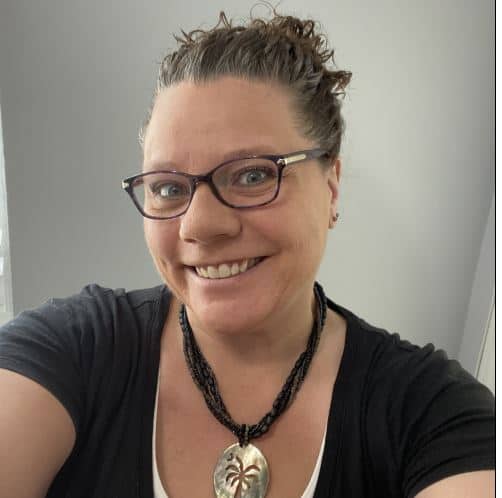
During the summer of 2017, Laurie Potz started to notice stains on her bra cup. At first, she thought she was just spilling coffee or soda. But as time went on, she realized the dark stains in her bra were only on the left side. “I realized it was actually a discharge coming from me, I wasn’t spilling anything,” she said.
Laurie’s OBGYN did an exam and sent a sample of the discharge to pathology, then referred Laurie to a breast surgeon for a diagnostic mammogram and ultrasound. The diagnosis came back as intraductal papillomas, a benign breast condition where small growths develop in the milk duct. Laurie underwent surgery to remove the milk duct and was monitored with a diagnostic mammogram every six months.
In January 2019, Laurie’s mammogram came back abnormal, but the doctor told her they’d monitor it for another six months. The discharge from Laurie’s left nipple continued. Then she started to have discharge from her right nipple.
“I thought, no, this is not normal,” Laurie recalled. Six months passed and her next mammogram also came back abnormal, and again her doctor said they would continue to monitor it. “They could see that what was there wasn’t normal, but it didn’t have the characteristics of cancer,” she said.
Laurie knew it was time to act. The thought of waiting another six months was unimaginable. She asked the doctor to biopsy the spot. “They didn’t think it looked like cancer, so they didn’t think a biopsy was necessary,” Laurie said. “The doctor really didn’t think it was a big deal, but she said ‘okay, we’ll do a biopsy if you want, but it will come back negative.’”
Two days later, Laurie received the call that changed her life. “It was breast cancer. It was like my whole world turned upside down at that point,” Laurie said. “I cried and was upset, but I also felt a sense of peace. I knew something was wrong with my body, but no one was listening, so I had to push for the biopsy. That’s why I believe in being an advocate for yourself. If something is wrong, keep pushing for answers.”
Two weeks after her diagnosis, Laurie developed shingles. This delayed the start of her treatment for six weeks, which added to her stress. “By the time I had the mastectomy, the tumor was almost stage 2 because it grew so fast,” she said. Laurie underwent two mastectomies, a flap reconstruction and chemotherapy.
“I think the surprising thing about my breast cancer experience is that it’s propelled me to help others. I want to change the world,” Laurie said. “Nobody talks about nipple discharge. There are so many symptoms people might not be aware of – discharge, changes in your skin, dimpling. People may not realize these are potential signs of breast cancer, and there’s a possibility that when they do get diagnosed, it will be too late.”
When Laurie was first diagnosed with breast cancer, her doctor gave her a stern warning: Do not use search engines to find answers. Instead, the doctor gave her a list of reading materials and online resources, including Susan G. Komen’s website. “There was so much good information on Komen’s site,” she said. “Not just about breast cancer and treatment, but about advocacy, as well.”
Soon after she completed active treatment, Laurie became an advocacy ambassador for Komen. “Daily I am emailing my senators and representatives. We need to change laws. I had so many diagnostic mammograms and MRIs that were not covered by my insurance,” she said. “We’re a normal, middle- class family, but what if I were living paycheck to paycheck? How would I have managed to pay my bills, how would I have navigated, ‘do I pay my rent or do I get a mammogram?’ No one should have to worry about that.”
Laurie visits her oncologist every six months. She and her husband live near the beach and she’s active in bulldog rescue. “Komen is doing amazing work. They’re trying to change the laws to get better coverage for people,” she said. “They are doing the important work, and I’m thrilled to be doing my part as an ambassador.”
Statements and opinions expressed are that of the individual and do not express the views or opinions of Susan G. Komen. This information is being provided for educational purposes only and is not to be construed as medical advice. Persons with breast cancer should consult their healthcare provider with specific questions or concerns about their treatment.



